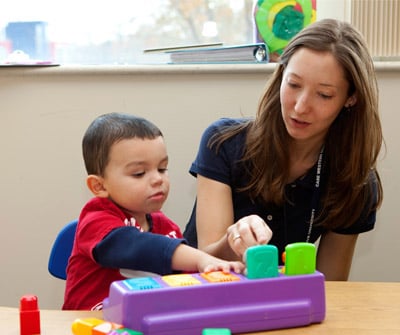In 2022, Brain Injury Awareness Month highlights #MoreThanMyBrainInjury by bringing awareness to some brain injury facts and statistics from the Brain Injury Association of America (BIAA).
Brain Injury Awareness and Recovery
Tags: Speech, Language, Communication, Brain Injury, talking, Communication Access, Speech therapy, Stroke recovery
Morning Communication Activities at Home
You may find it challenging to access beneficial resources that allow you to properly care for your loved one. We have researched some at-home activities that encourage communication for adults who are recovering from a stroke or maintaining skills after a neurodegenerative diagnosis. These morning activities consist of routines that get you both up and moving and allow for independent participation.
Tags: Speech, Language, Communication, Support, Caregiving, Brain Injury, Voice, talking, Speech therapy, Stroke recovery
Stroke Recovery: After the Hospital
Preparing to go home after a hospital stay is never easy, especially after having a stroke. It can be a very overwhelming process with new challenges in thinking, memory, and mobility. The length of your hospital stay after a stroke can range anywhere from a few days to months depending on the severity of the stroke and the support system in place at home. There are many feelings associated with going home, excited to be back home along with feelings of anxiety or worry.
Tags: Speech, Language, Communication, Support, Stroke, Brain Injury, talking, Speech therapy, Stroke recovery
Stroke Recovery: A Whole Life Approach
Welcome to the first of a blog series on stroke recovery resource information from Cleveland Hearing & Speech Center (CHSC). Topics of the series include first action steps following a stroke, benefits of speech therapy, communication strategies, tips for caregivers, and much more.
Tags: Speech, Language, Communication, Support, Stroke, Caregiving, Brain Injury, Voice, talking, Speech therapy, Stroke recovery
Speech-Language Concerns? Don't Wait - Evaluate!
“They’re still young - let’s just wait and see.” Coming from a pediatrician, this phrase holds a lot of power over parents worried about their child’s speech and language skills. The parents may have expressed a concern that their two-year-old hasn't started talking yet, is only saying a few words, or is very hard to understand. When the pediatrician brushes it off as not a big deal, the natural response from parents is to trust someone they consider an expert.
Tags: Speech, Language, Communication, toddler, talking, Early Intervention
Baby Sign Language Improves Communication
Infant sign language really does deliver on its promise of improved communication. This is particularly appealing for new parents, given that there’s a well-recognized gap between what babies and toddlers want to say and what they are able to say. Sign language can help ease frustration between ages 8 months and 2 years — when children begin to know what they want, need, and feel but don't always have the oral motor verbal skills to express themselves. Basic sign language can help babies better express themselves as early as 8 or 9 months and it can mean decreased frustration (for both caregiver and child), promote earlier language skills and enhanced bonding with those who sign.
Tags: Speech, Language, Communication, American Sign Language, ASL, Learning, toddler, talking, Early Intervention, Communication Access, Baby Sign Language
“People Play” - Speech and Language Fun Time with Your Child
To get young children talking, we often motivate them by showing that “using your words” can get you what you want. A simple way to achieve this is through “People Play”. People Play describes “songs, games and activities in which the fun happens when the child interacts with another person” (The Hanen Program, More Than Words). So grab a blanket or a couch cushion and enjoy some of these great ways to play and interact that will also motivate your child to request more fun! The one-word language suggestions can always be lengthened into phrases or sentences depending on your child’s expressive language level.
Tags: Speech, Language, Communication, Learning, toddler, talking
I'm Losing My Voice - What Does That Mean?
Imagine: A child comes home from cheering for their favorite team at a high school game, and their voice sounds raspy. The next day when they wake up, their voice is gone completely and they can barely speak at all. Sound familiar? Maybe a similar occurrence has happened to you, except it was when you woke up with a bad head cold. This is something we commonly hear people refer to as “losing my voice.” What people think of as “losing their voice” can range from a hoarse, raspy voice to no voice at all. Have you ever wondered what exactly happens to our body to cause this to happen?
Tags: Speech, Language, Communication, Voice, talking
More Talking Please! 7 Fun Activities to Promote Speech & Language in the Young Child
Everyday activities can be opportunities to expand learning – particularly for speech and language. Here are seven easy, familiar options you can do at home with your child that offer speech and language cues. Encourage the child to repeat words or anticipate the next word or sentence. For example, after we put on our socks, what comes next? Shoes.
Tags: Speech, Language, Communication, Learning, toddler, talking
What is Selective Mutism and How is it Treated?
Selective mutism is a complex childhood anxiety disorder characterized by a child’s lack of verbal communication in select social environments, such as school. Children with selective mutism possess the ability to speak, but are selective of the settings in which they choose to speak. They will often speak in environments where they feel safe, relaxed, and calm with familiar people such as parents or siblings, but will choose not to speak in environments where they are less comfortable. A common misconception is that selective mutism is a form of autism. Children with selective mutism may demonstrate lack of appropriate social language use that mimics those on the autism spectrum, but selective mutism is not indicative of autism.
Tags: Speech, Language, Communication, Stuttering, Learning, Voice, talking


















